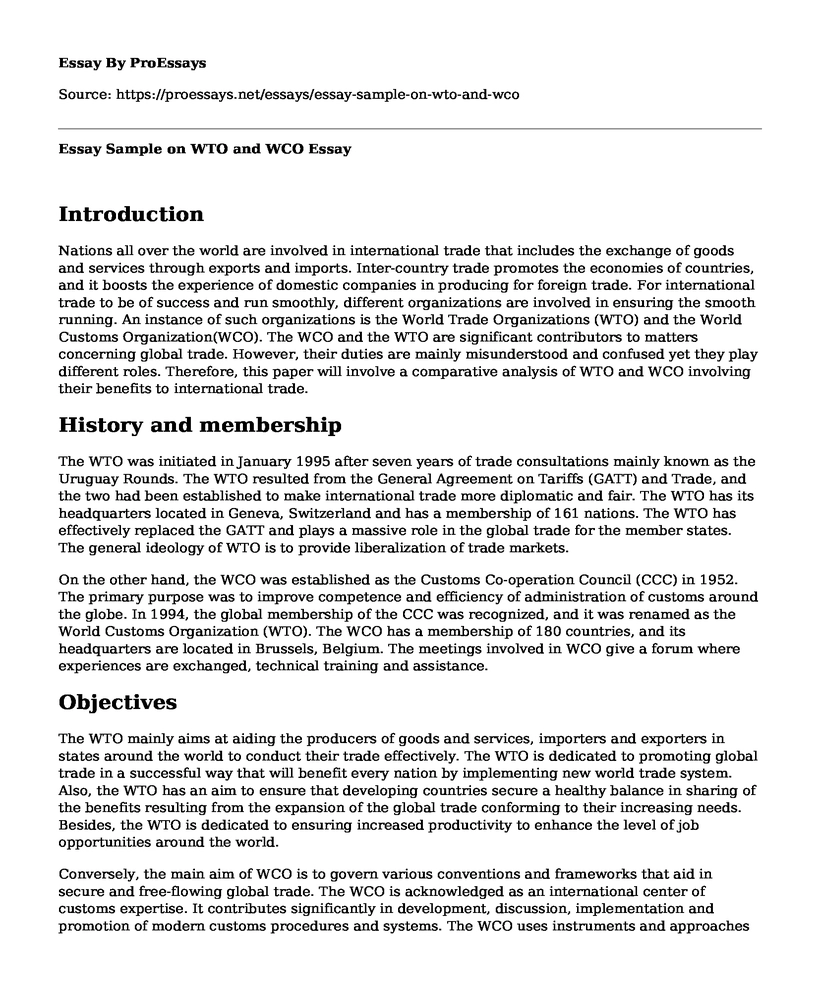Introduction
Nations all over the world are involved in international trade that includes the exchange of goods and services through exports and imports. Inter-country trade promotes the economies of countries, and it boosts the experience of domestic companies in producing for foreign trade. For international trade to be of success and run smoothly, different organizations are involved in ensuring the smooth running. An instance of such organizations is the World Trade Organizations (WTO) and the World Customs Organization(WCO). The WCO and the WTO are significant contributors to matters concerning global trade. However, their duties are mainly misunderstood and confused yet they play different roles. Therefore, this paper will involve a comparative analysis of WTO and WCO involving their benefits to international trade.
History and membership
The WTO was initiated in January 1995 after seven years of trade consultations mainly known as the Uruguay Rounds. The WTO resulted from the General Agreement on Tariffs (GATT) and Trade, and the two had been established to make international trade more diplomatic and fair. The WTO has its headquarters located in Geneva, Switzerland and has a membership of 161 nations. The WTO has effectively replaced the GATT and plays a massive role in the global trade for the member states. The general ideology of WTO is to provide liberalization of trade markets.
On the other hand, the WCO was established as the Customs Co-operation Council (CCC) in 1952. The primary purpose was to improve competence and efficiency of administration of customs around the globe. In 1994, the global membership of the CCC was recognized, and it was renamed as the World Customs Organization (WTO). The WCO has a membership of 180 countries, and its headquarters are located in Brussels, Belgium. The meetings involved in WCO give a forum where experiences are exchanged, technical training and assistance.
Objectives
The WTO mainly aims at aiding the producers of goods and services, importers and exporters in states around the world to conduct their trade effectively. The WTO is dedicated to promoting global trade in a successful way that will benefit every nation by implementing new world trade system. Also, the WTO has an aim to ensure that developing countries secure a healthy balance in sharing of the benefits resulting from the expansion of the global trade conforming to their increasing needs. Besides, the WTO is dedicated to ensuring increased productivity to enhance the level of job opportunities around the world.
Conversely, the main aim of WCO is to govern various conventions and frameworks that aid in secure and free-flowing global trade. The WCO is acknowledged as an international center of customs expertise. It contributes significantly in development, discussion, implementation and promotion of modern customs procedures and systems. The WCO uses instruments and approaches that are recognized as the foundations of sound customs administration worldwide. Its primary goal is to promote the efficiency of administrations of member customs. As a result, it aids the member states to contribute effectively to goals of development especially revenue collection, security, and collection of trade statistics.
Functions
The WTO is designed to be a watchdog in the global trade of services, goods, foreign investment, and intellectual property. Article III provides several functions for WTO. Firstly, the WTO is to facilitate the administration, implementation, and operation and to further the goals of the GATT. It should also provide a framework for the implementation and administration of trade agreements. Secondly, the WTO should provide a forum where the member countries negotiate matters relating to their multilateral trade relations. Also, the WTO is mandated to administer an understanding of the rules and procedures governing dispute settlement. Likewise, the WTO is delegated with the function of delivering a mechanism for trade policy review.
Article III of the Convention initiating WCO stipulates several functions for the WCO. Firstly, WCO should assess the technical aspects and the economic factors related to customs systems with the aim of proposing to its members a practical means of attaining a maximum degree of uniformity and harmony. Secondly, the WCO is mandated with the duty to ensure the circulation of information concerning the regulation of customs and procedures. Also, it is obligated to provide interested nations with information or advice regarding matters of customs and recommendations where required. Similarly, the WCO had the duty to cooperate with other international organizations concerning issues within its proficiency.
Conclusion
As international trade is progressing day in day out, the WTO and WCO continue to contribute significantly through dedication to their goals and functions. The WTO plays a substantial role in negotiating multilateral trade agreements in global trade. Through the WTO, the member states can achieve a consensus on lowering tariffs on foreign trade. The WCO, on the other hand, contributes significantly in administrating global customs standards. The WCO upholds the technical aspects of the WTO agreements on customs valuation. The WTO together with the WCO plays complementary roles that will continue facilitating the global supply chain.
Cite this page
Essay Sample on WTO and WCO. (2022, Nov 11). Retrieved from https://proessays.net/essays/essay-sample-on-wto-and-wco
If you are the original author of this essay and no longer wish to have it published on the ProEssays website, please click below to request its removal:
- Overview and Management of Ooredoo Oman and Econet Wireless Burundi
- Effect of Globalization on the U.S. Labor Market Essay
- Impact of Price Floor to Unemployment Essay
- Paper Example on Global Trade: China's Dominance in 21st Century Economy
- Unlocking the Macroeconomic Potential of Colombia - Essay Sample
- Syria Crisis: Fights, IS Takeover, & Foreign Interventions - Essay Sample
- Recruiting and Selecting Qualified Candidates: Best Practices in the Digital Era







